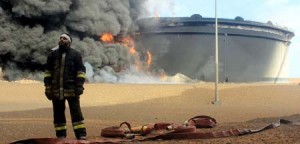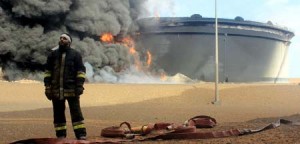- Prices have been low for more than two years. With demand rising and supply falling, that’s all beginning to change
Foreign Policy Magazine
KEITH JOHNSON
 In the past two years, a flood of crude has pushed down oil prices, battering corporate balance sheets and wreaking havoc with budgets in oil-dependent countries from Russia to Iraq.
In the past two years, a flood of crude has pushed down oil prices, battering corporate balance sheets and wreaking havoc with budgets in oil-dependent countries from Russia to Iraq.
That’s beginning to change thanks to the double whammy of rising demand and pinched supplies of oil — especially unplanned outages and disruptions in places like Canada, Nigeria, and Libya. Expect prices to start rising in response.
On Tuesday, the International Energy Agency said it expects the oil market to be balanced for the rest of the year, meaning the world will pump roughly as much oil as it consumes. That should nudge prices higher. Oil is currently trading around $50 a barrel, double the nadir reached earlier this year.
If the oil market is getting closer to a normal balance of supply and demand, it’s no thanks to major producers inside OPEC — especially Saudi Arabia — that have kept pumping with abandon even as prices plummeted.
Rather, the market can thank global disruptions of oil supplies, which in May reached their highest level in five years. The production declines were in large part due to wildfires in Canada that knocked some oil sands production in Alberta offline.
Other oil-producing regions have also been reeling: A new generation of militants in the Niger delta in southern Nigeria are targeting crude production facilities there, while Libya’s continued political disintegration has kept oil production and exports there at a fraction of prewar levels. Other major oil-producing countries, especially Venezuela, face severe economic and political stresses; plenty of energy experts figure Venezuelan exports could tumble sharply later this year.
Altogether, those outages, attacks, and wildfires knocked 3.7 million barrels of oil production a day offline. That helped push oil prices to their yearly high. For the past two years, the world was so awash in oil that the market could afford to shrug off the virtual disappearance of the Libyan oil industry, for example, or watch the return of Nigerian rebels with equanimity. Now, though, outages are set to cause bigger ripples in a tighter market.
“We aren’t yet back to the situation where every potential supply hiccup puts a couple of dollars on the price, but the market is definitely awake to geopolitics again,” said Richard Mallinson, an analyst at Energy Aspects, a consultancy in London.
While the wildfires in Canada, which at their worst took off more than 1 million barrels a day of production, are winding down, disruptions in Nigeria and Libya are likely to be long lasting, the IEA said. And those outages have done what OPEC chose not to do: Close the spigot a bit.
“The spate of disruptions have helped put a more solid floor under crude prices and accelerated the rebalancing in global supply and demand,” said Robert McNally, founder and president of the Rapidan Group, an energy consultancy.
Nigeria is a particular concern because of both the scope of the disruption — vandalism and attacks knocked out close to 1 million barrels per day of production in May — and because the new generation of militants seems unwilling to negotiate with the government as their predecessors did. Mallinson said Nigeria faces the “potential for prolonged disruptions of the type seen in 2006-09,” when militants systematically targeted foreign oil companies and their production in Nigeria.
Those outages by themselves wouldn’t necessarily be cause for concern, or at least they haven’t been for the past two years. But now that demand for oil is also rebounding — that’s particularly true in India as well as in the world’s two-biggest oil consumers, China and the United States — there’s less slack in the system if something goes wrong.
And that’s especially the case given Saudi Arabia’s flat-out oil production policy. The kingdom is still pumping oil at near-record levels, producing 10.2 million barrels a day. That means Saudi Arabia has a lot less ability to “surge” oil production to meet global needs; the more it pumps on a daily basis, the less spare production capacity there is inside OPEC.
And since spare capacity is essentially the shock absorber for the global oil market, the world could soon be in for a very bumpy ride.
“Prices will be jumpier as well, spiking in response to disruptions or the risk of disruptions, given Saudi Arabia’s very low spare production capacity,” McNally said.




